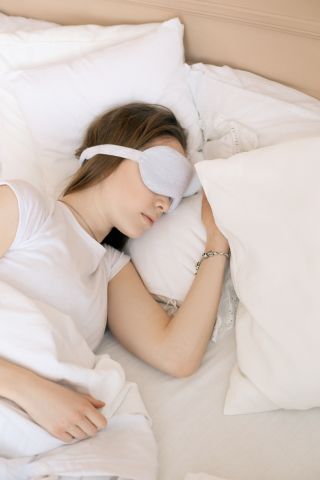Sleep
5 Tips to Help Your Teen Develop Healthy Sleep Habits
Sleep is a fundamental characteristic of self-care.
Posted October 23, 2023 Reviewed by Abigail Fagan
Key points
- Sleep is vital to our health, and teens tend not to get enough "good" sleep.
- Napping feels great in the moment, but it can negatively impact sleep at night.
- Eliminating caffeine, bright screens, and food right before bed can help teens get better sleep.

Sleep is a fundamental and often misunderstood aspect of our lives, essential for maintaining both physical and mental well-being. Yet, in today's fast-paced society, where productivity and efficiency are highly valued, people tend to compromise on sleep, thinking they can make up for it later. This is especially so for teenagers and their parents.
A National Institutes of Health report (Hershner & Chervin, 2014) investigated sleep patterns among college students. The authors focused primarily on daytime sleepiness, “defined as the inability or difficulty in maintaining alertness during the major wake period of the day, resulting in unintended lapses into drowsiness or sleep.” The NIH report found that 60% of their sample say they are “dragging, tired, or sleepy” at least three days a week, and more than 80% said their loss of sleep negatively impacts their academic performance. The report indicates that college students rank sleep problems as the number two cause of difficulties, with stress being number one. While the study examined young adults mostly in college, the implications for sleep generalize nicely to teenagers too.
First and foremost, sleep is crucial for physical health. During sleep, the body undergoes a process of restoration and repair. Muscles are repaired, tissues are regenerated, and the immune system is strengthened. Chronic sleep deprivation has been linked to a weakened immune system, making individuals more susceptible to infections and illnesses. This could be one of the reasons it seems like everyone is sick on campus during midterms and finals.
Moreover, adequate sleep is vital for cognitive function and memory. During sleep, the brain processes and consolidates the information and experiences acquired during the day, aiding in memory retention and learning. A good night's sleep can significantly improve concentration, which positively impacts academic performance.
Sleep also has a profound impact on emotional well-being and mental health. Sufficient sleep is essential for regulating emotions and maintaining emotional stability. Lack of sleep can lead to increased irritability and heightened stress levels. It can also contribute to the development or exacerbation of mental health disorders such as anxiety and depression. A well-rested student is better equipped to manage stress, cope with challenges, and maintain a positive outlook on life.
Five Tips for Healthy Sleep
Remember, many factors influence a good night’s sleep, and some of them are harder for teens to control. Let’s focus on five of the most common suggestions for improving sleep.
1. Give your body a consistent schedule. Because the average person needs only seven to eight hours of sleep, you should avoid trying to catch up by sleeping for much more than that. If you can try to go to bed and get up at a consistent time each day, your body will respond nicely. You will fall asleep quicker and wake up easier and, most importantly, feel more rested. Being consistent helps set your body’s sleep-wake cycle.
2. Avoid eating and drinking right before bed. Try not to go to bed right after a big meal or late-night snack. While your body is processing the food, it can be disruptive to your sleep patterns. The same can be said about going to bed too hungry. Ideally you will not eat for about two hours before trying to fall asleep.
Drinking too much water right before bed is likely to disrupt your sleep too. Water is great for you, and drinking water to stay hydrated throughout the day is a very healthy habit, but too much at once and especially right before bed isn’t a great idea. The same thing can be said for caffeine. We know that coffee and energy drinks are commonplace with teenagers, but try to avoid them for a few hours before your planned sleep time. This can be hard when you need the caffeine to stay alert while studying and then need to get to sleep when done. A little strategic planning should help you get the caffeine effect you need to be productive, while planning on the effect to wear off toward the end of your study session.
3. Try to avoid daytime naps. When you are sleepy during the day, it feels great to close your eyes and take a nap. However, long daytime naps will often interfere with your nighttime sleeping. An occasional nap to catch up on sleep is fine, but try to avoid taking naps that last for more than an hour and those that occur late in the day. Remember, the goal is regular and predictable sleep patterns.
4. Physical activity promotes better sleep. Including regular physical activity in your daily schedule has numerous obvious effects, but it is also good for your sleep. Like most things, too much vigorous exercise right before trying to sleep can have a detrimental effect. Light exercise during the day is a great way to facilitate restful sleep.
5. A calm and peaceful environment promotes restful sleep. This might be one of the hardest things for a teenager to control. If you can create a sleep space that is cool, quiet, and dark, you have an advantage at sleep time. Too many distractions and you are likely to find that your sleep suffers. A room that is bright and screens that emit light are cues for your brain to be active and pay attention rather than relax and prepare for sleep.
The notion of "burning the midnight oil" and catching up later may seem effective in the short term, but it can have detrimental effects on one's health and performance over time. Sleep is a vital component of physical and mental well-being. Its importance extends beyond feeling rested; it impacts our immune system, cognitive function, emotional stability, and overall quality of life. It is crucial for college students to make sleep a priority. Ultimately, a well-rested student is healthier, happier, and more productive.
References
Hershner, S. D., & Chervin, R. D. (2014). Causes and consequences of sleepiness among college students. Nature and Science of Sleep, 6, 73–84. https://doi.org/10.2147/NSS.S62907




